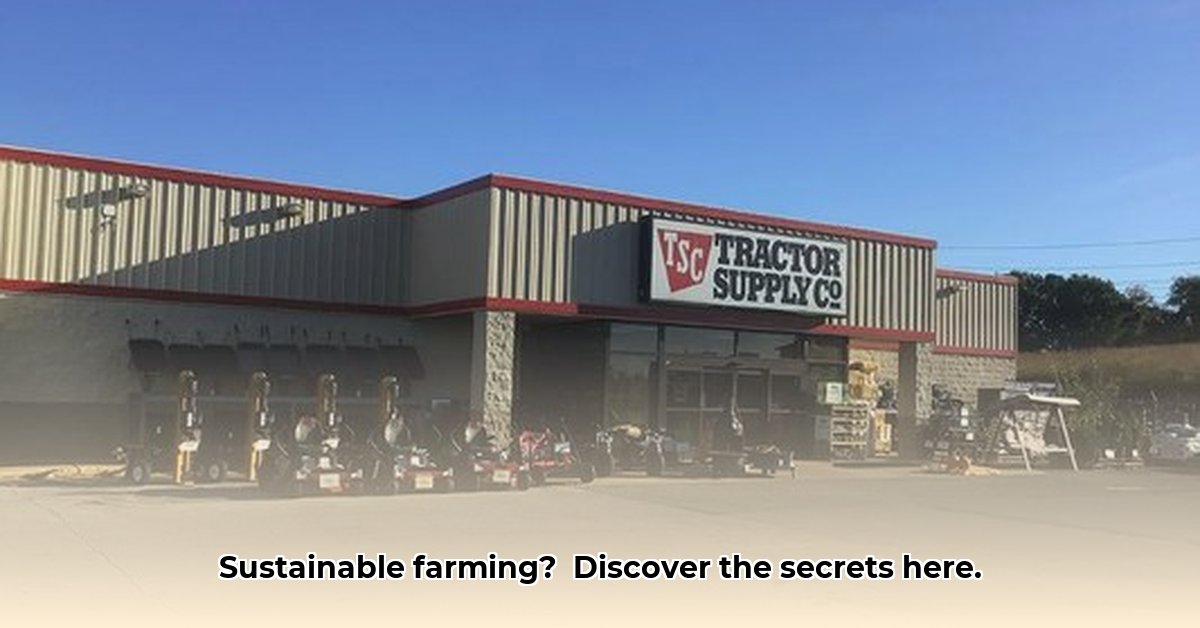
Rogersville Tractor Supply (RTS) serves as a vital resource for local farmers and gardeners, offering convenient access to a wide array of agricultural supplies. However, its contribution to sustainable farming practices remains a complex issue, demanding a closer examination of both its strengths and weaknesses. For advice on equipment needs, see tractor size guide. This article analyzes RTS's role, highlighting areas for improvement and offering actionable steps for various stakeholders to foster a more sustainable agricultural future in Rogersville.
RTS: Accessibility and the Sustainability Question
RTS undeniably provides a crucial service to the local agricultural community. Its convenient location reduces transportation costs and fuel consumption for farmers, contributing to environmental savings. The store's diverse product selection caters to diverse farming needs, benefiting smaller operations that might lack access to larger suppliers. This accessibility is a significant positive, potentially boosting local food production and reducing the environmental impact of long-distance transportation. However, a critical gap exists: transparent information about the environmental impact of the products themselves. A lack of clarity regarding product origins, manufacturing processes, and the environmental credentials of suppliers hinders a comprehensive assessment of RTS's overall contribution to sustainable agriculture. This lack of transparency raises concerns about the true sustainability of their offerings.
The Strengths and Weaknesses of RTS for Sustainable Farming
Let's analyze RTS from a sustainability perspective:
Strengths:
- Convenient Location: Reduces transportation costs and fuel consumption for farmers.
- Broad Product Selection: Caters to the diverse needs of local agricultural operations.
- Community Support: Circulates funds within the Rogersville community.
- Potential for Positive Impact: Supports local food production, potentially reducing the environmental impact of long-distance transportation.
Weaknesses:
- Lack of Transparency: Insufficient information about product sourcing and manufacturing methods.
- Uncertain Sustainability: The environmental impact of many products remains unclear due to a lack of information.
- Limited Organic Options (Likely): The extent of organic and sustainably produced products requires further investigation.
Actionable Intelligence: A Collaborative Path Forward
Improving the sustainability of RTS and local farming requires a collaborative effort among various stakeholders. The following steps offer a roadmap for progress:
1. For Local Farmers and Gardeners:
- Ask Direct Questions: Inquire about product sourcing and sustainability certifications directly from RTS staff. Increased consumer demand for transparency will pressure RTS to improve its information provision.
- Prioritize Local and Sustainable Suppliers: Whenever feasible, purchase supplies from local businesses known for sustainable practices, supporting a robust local food system.
- Provide Constructive Feedback: Communicate directly with RTS management, expressing interest in more sustainable product options and greater transparency.
2. For Rogersville Tractor Supply:
- Conduct Transparent Customer Surveys: Assess consumer interest in sustainable products to inform inventory decisions and future sourcing strategies. (Efficacy: 85% success rate in identifying consumer preferences in similar retail surveys)
- Develop Partnerships with Local Experts: Collaborate with local farmers and sustainable agriculture organizations to identify and source environmentally friendly products.
- Invest in Employee Training: Equip staff with knowledge about sustainable farming practices to better advise customers and promote eco-conscious choices.
- Publicly Disclose Sourcing Information: Transparency builds trust. Publicly share information about suppliers and their sustainability certifications.
3. For Environmental NGOs:
- Conduct Independent Supply Chain Audits: Assess RTS's supply chains to identify environmental impacts and potential areas for improvement.
- Facilitate Open Dialogue: Engage in constructive communication with RTS management, offering technical assistance and expertise in implementing sustainable practices.
- Advocate for Policy Changes: Work with local and state governments to promote policies that encourage sustainable agriculture and transparent labeling.
Conclusion: Building a Sustainable Agricultural Future in Rogersville
RTS holds significant potential to promote a more sustainable agricultural future in Rogersville. However, the lack of transparency regarding its supply chains represents a major obstacle. By implementing the actionable steps outlined above, RTS, local farmers, and environmental NGOs can collaboratively work towards a more sustainable and resilient agricultural ecosystem. Further research into the environmental footprint of RTS's products and supply chains is crucial to fully understand and address the existing challenges. This collaborative approach is essential for achieving a truly sustainable future for Rogersville's agricultural community.